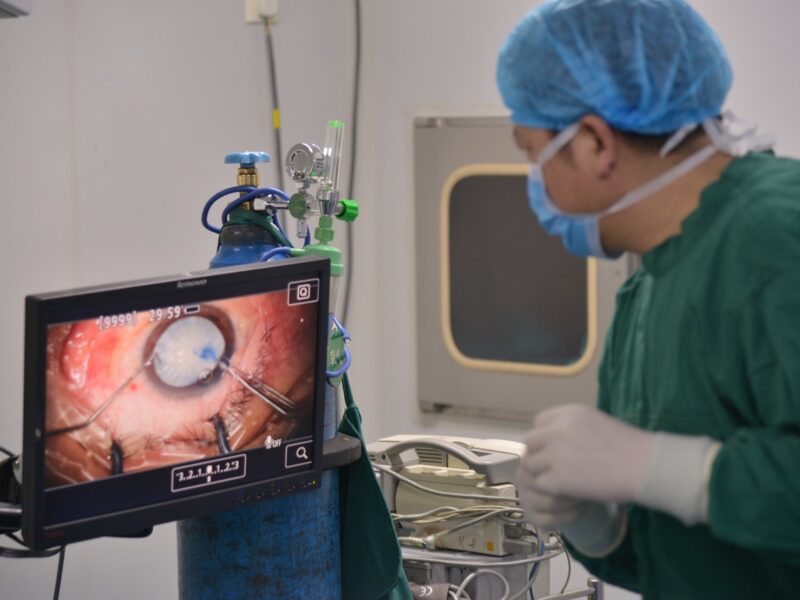Ophthalmology, or eye surgery, is one of the most specialized and diverse medical industries that provide different career opportunities to medical professionals.
With the rise in technology, growing awareness about eye health, and an aging population, the demand for eye surgery medical jobs and other eye surgeons related in the USA is increasing at an unprecedented rate.
Understanding Eye Surgery Medical Jobs
Eye surgery medical jobs are those professions concerned with diagnosing and performing the treatment of eye conditions with surgical intervention.
These range from highly specialized surgeons who carry out complex eye surgeries to supportive medical professionals who assist with pre-operative and post-operative care.
Following are some of the most frequent eye surgery medical jobs:
1. Ophthalmologists: These are medical doctors specializing in diagnosing and performing eye surgery on eye diseases. Ophthalmologists are fully licensed physicians with higher education and training in eye care.
2. Optometrists: Even though they do not perform surgical procedures, the role of an optometrist is very important in diagnosing and managing vision problems. They work in collaboration with ophthalmologists in providing comprehensive eye care.
3. Ophthalmic Surgeons: These are a special breed of ophthalmologists who specialize in surgical interventions, including cataract removal, laser eye surgeries, and transplanting corneas.
4. Surgical Technologists: Surgical technologists are those who assist the surgeons during ocular surgery in preoperative preparation of the operating room, sterilization, and with instruments.
5. Eye Care Nurses: The nurses specialized in eye care assist in the treatment of patients pre-operatively and post-operatively undergoing eye surgery to monitor their recovery and assist them in pain management.
Salary Expectations for Eye Surgery Medical Jobs
Salaries for eye surgery medical jobs can be very different regarding position, experience, and location. Most of the positions concerning eye surgery are well-paid, reflecting a high level of expertise and specialization.
1. Ophthalmologists: The Bureau of Labor Statistics (BLS) estimates ophthalmologists with median annual wages of around $300,000. It does say that a top earner would approach an intake of upwards of $500,000 per year, especially in places where they work on high-end procedures such as eye surgical LASIK or even cataracts.
2. Optometrists: Even optometrists, without doing surgeries, can make a lot. The approximate annual median salaries that optometrists make have been about $120,000 per year, with possible variation based on experience and physical location.
3. Ophthalmic Surgeons: Ophthalmic surgeons are specialists. They are supposed to be ophthalmologists with a special relation to surgery; they tend to handle salaries comparable in measure to general ophthalmologists. In broad terms, an average salary varies from $250,000 to $500,000 every year.
4. Surgical Technologists: Surgical technologists who specialize in eye surgery can expect to be paid between $45,000 and $65,000 yearly depending on experience and location.
5. Eye Care Nurses: Registered nurses in the field of eye surgery typically earn between $70,000 and $90,000 per year. Specialized certifications in ophthalmology nursing can lead to higher pay.
Qualifications and Education for Eye Surgery Medical Jobs
In order for you to work in an eye surgery field or any other related job, you need to meet certain educational and training requirements.
1. Ophthalmologists: Ophthalmologists require a number of years in training after the initial post-graduation education: one must complete a four-year undergraduate education, followed by medical school, then three years of residency.
Fellowships are often required beyond that, if you want to work with retina surgery or corneal transplant surgery.
2. Optometrists: Optometrists must study for a four-year OD program after they obtain their bachelor’s degree. They are supposed to take the national and state examinations in order to be licensed for optometry.
3. Ophthalmic Surgeons: An ophthalmic surgeon is usually an ophthalmologist who desires to practice as a surgeon. These doctors can choose to be in fellowship with special surgical skills such as cataract surgery or refractive surgery after their medical school and residency.
4. Surgical Technologists: These require a postsecondary educational program, usually lasting about one year. Certification by organizations such as the National Board of Surgical Technology and Surgical Assisting (NBSTSA) is available.
5. Eye Care Nurses: These usually require a registered nursing degree, with additional certification in ophthalmic nursing provided by organizations such as the American Board of Ophthalmic Surgery (ABOS).
Eye Surgery Medical Jobs Outlook and Opportunities
The services of medical professionals specializing in eye surgery will be in extremely high demand shortly. Check out
The US population is aging, and with life expectancy increasing, the incidence of age-related diseases of the visual organs is growing. Such diseases require surgical treatment and subsequent care; hence, qualified specialists are always in demand.
The Bureau of Labor Statistics projects that employment of ophthalmologists will grow 4 percent from 2020 to 2030, as fast as the average for all occupations. Optometrists are projected to see a 10 percent increase in demand because of the increasing need for eye exams and vision correction.
Frequently Asked Questions about Eye Surgery Medical Jobs
Q1: What are the advantages of eye surgery medical jobs?
Eye surgery is a very well-paid profession, has good job security, and the satisfaction of knowing that one can help improve the quality of life for their patients. With the aging population and advancements in eye care, the demand for professionals in this field is expected to remain strong.
Q2: Can I get any specialization or super specialization in eye surgery medical jobs?
For instance, ophthalmologists could practice ocular surgical interventions in conditions like cataracts, retina surgical repair, refractive eye procedures, and cornea transplantation. Yes, more specialized training in fellowship allows getting further specialization in one area or another.
Q3: Are there any certifications associated with eye surgery medical jobs?
Many of them do not require certification, but it is a plus. For instance, surgical technologists and nurses could obtain certifications as an ophthalmic surgery technician or nurse, showcasing their expertise within the field.
Q4: How long does it take to become an ophthalmologist?
It generally takes 12 years of education and training to become an ophthalmologist: 4 years for a bachelor’s degree, 4 years of medical school, and 3-4 years of residency.
Q5: What is the job outlook for ophthalmologists?
The job outlook for ophthalmologists is bright, as the Bureau of Labor Statistics projects consistent growth because of the aging population and increased demand for eye care.
Conclusion
Medical careers in eye surgery have a lot to offer individuals seeking specialized health care.
Whether you want to work as an ophthalmologist, optometrist, or surgical technologist, this is a field that offers very good earning potential, job security, and the opportunity to make a significant difference in the lives of patients.
The continued development of medical technologies and aging population will probably ensure that eye surgery medical jobs remains a vital and thriving profession in the USA.






